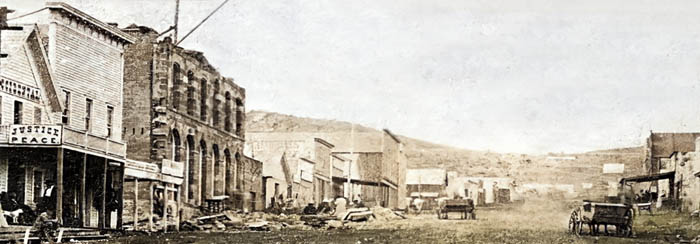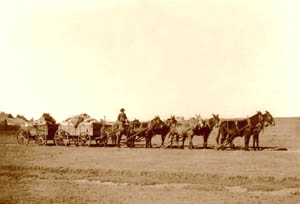
Hamilton, Nevada, 1868.
By William Daugherty, for the Reno Evening Gazette in 1891
A group of old-timers was talking over the late robbery when one of them related how he had been a detective before the Pinkertons had established a reputation on this coast, and how he had led a case to a successful conclusion without any knowledge of what he was doing or what it was leading to until years afterward. The story, as told in his own words and duly authenticated, was as follows:
In the town of Hamilton, Nevada in 1869, Wells, Fargo & Co. moved their office from the old building adjoining Red Frank Wheeler’s to the new brick-built by J.R. Withington at a cost of $60,000. In moving their safes, the agent, George Crandall, concluded to have the combinations changed and employed an expert to do the work. It was done in the old office at night and the safe was moved the following day. When opened, a sack containing $3,500, belonging to John Gray, the former agent of the company, was found to be missing.
So was the expert who had changed the combination. All in the office were thunderstruck, as they had stood by and witnessed the entire operation, and how the sack could have been taken was a mystery. But, suspicion pointed too strongly to that one person and his absence was corroborative proof. Three stage and fast freight lines were running from there to Elko, and at once, the wires were set to clicking with instructions to arrest the party if found. He was caught there on the arrival of the stage the next morning, but he didn’t have the money and simply denied it and declared his innocence. However, he was taken back, examined, and committed to jail to await the action of the grand jury. He proved to be a celebrated cracksman, but the most puzzling part of the matter was that he had no baggage, no confederates, exhibited no uneasiness, and as the old saying goes, he simply “sawed wood and said nothing.” The money could not be found.
Persistent efforts were made to get him to confess, but he simply denied all knowledge. Nearly a month elapsed when one of the other stage lines discovered a satchel in their Elko office that when examined was found to be empty. It was unclaimed baggage, but the proprietor suspected Tom —-, a former employee, of a little crookedness. At this juncture of affairs I was in Elko on a visit, when one of the proprietors said to me, without any further explanation, “Dick, I must go to Sacramento tonight, keep an eye on Tom. If he starts away on any train you go along with him and tell him to return. He will do so if you catch him going, but if you watch him and keep close to him he will not go. When the express comes in from Virginia tomorrow morning if he gets a letter and finds you watching him he will go to my office and leave a check for a large sum of money. Follow my instructions and it will be all right.” He left and I did as he told me, keeping close around Tom all the time and saying nothing yet wondering a great deal what it all meant. I was present when the express arrived on the next morning, with an eye on Tom. He received a letter, put it in his pocket, and with a furtive glance walked out the door. I followed with an indifferent look. The train was just moving out past us.
Tom looked uneasily at it, and then at me. The train was out of reach in a few seconds. Then, Tom turned with the decision and asked me to accompany him to the stage office. I did so and he laid down a check and asked the agent to give him a receipt. It was soon written, though the agent knew not what it meant any more than I did. Tom took the receipt and walked off without a word of explanation and without an inquiry from us. A few days later, the cracksman was discharged from the Hamilton jail, and the case remained a mystery to me for many years. A year ago, I met John Gray in the Palace Hotel in Reno and he told me that he recovered his money by giving an indemnifying bond to the stage proprietors, but he never knew where his money came from. I knew. The cracksman had taken passage on one stage line and sent his satchel by the other to Elko in another name. Tom got the sack after it had lain some time uncalled for, and sent the money to Virginia City. When he was casually asked if he could remember when it came to Elko he got scared, confessed, returned it, and was forgiven, but was promptly discharged. The cracksman would never admit anything, but he skipped very quickly when he was turned loose.
By William Daugherty article in the Reno Evening Gazette, April 23, 1891. Compiled and edited by Kathy Weiser/Legends of America, updated June 2021.
About the Author: Written by William Daugherty, for the Reno Evening Gazette in 1891. The Reno Evening Gazette was first published on October 12, 1876, and continued for the next 107 years. In 1977, it was merged with the Nevada State Journal and continues to exist today as the Reno Gazette-Journal.
Also See:
Pioneers on the Nevada Frontier (Reno Evening Gazette)
Nevada Mining Tales (Reno Evening Gazette)
Pioche Land Jumpers and the Death of Jack Harris (Reno Evening Gazette)
Stagecoaches of the American West
Violence on the Nevada Frontier (Reno Evening Gazette)

